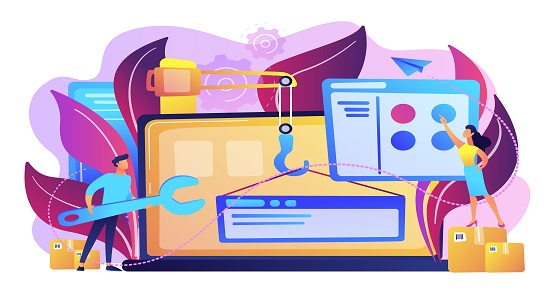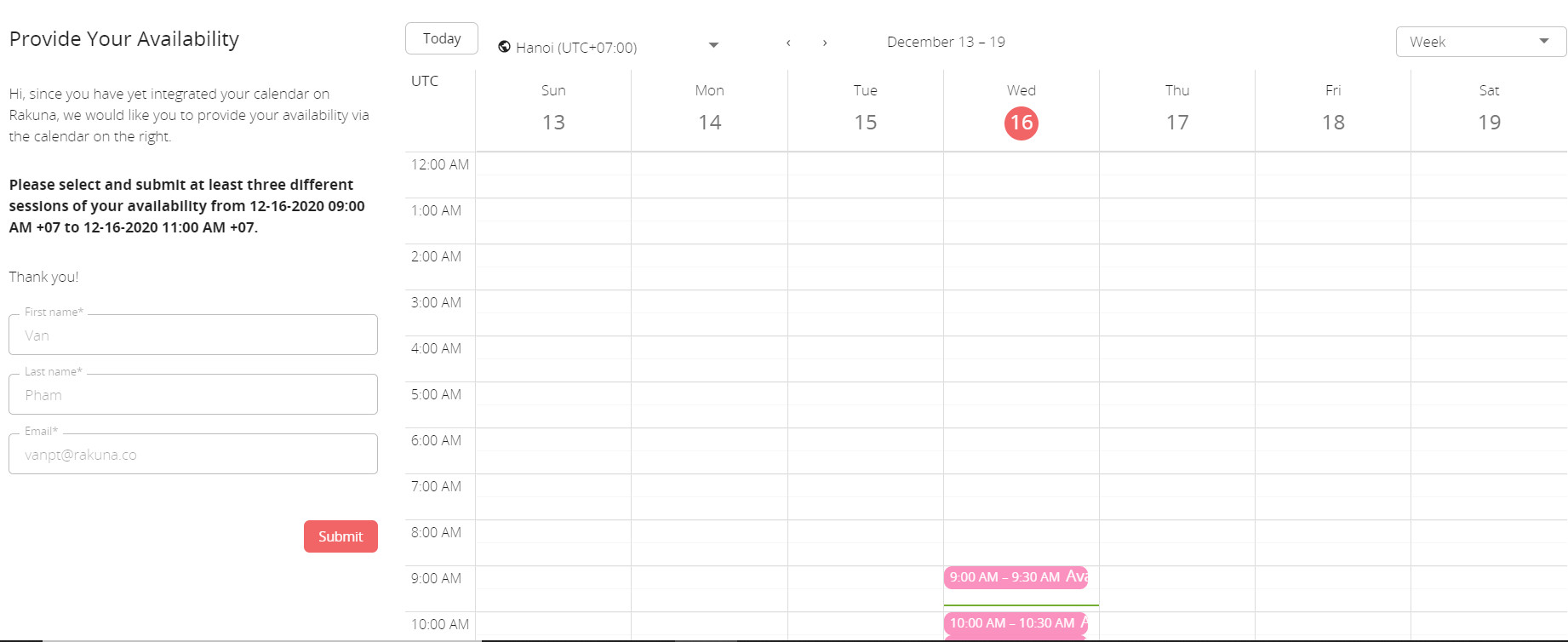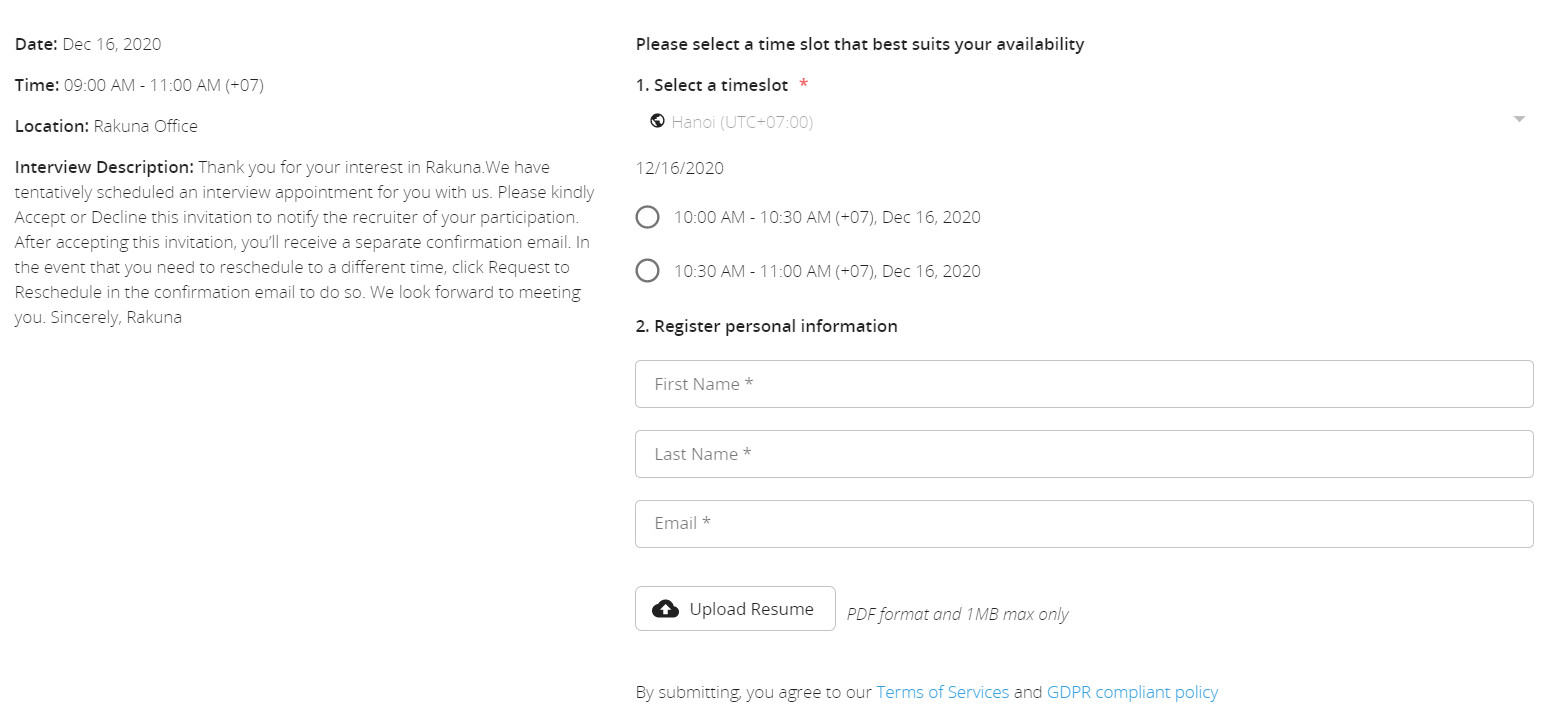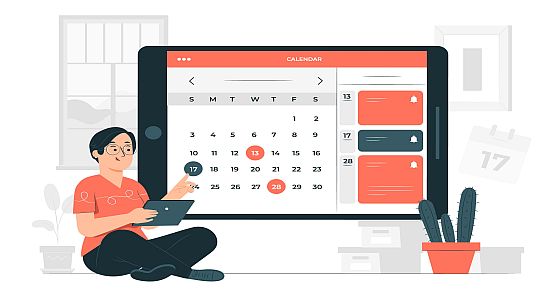Conducting multiple interviews is a crucial step to finding candidates who have the required competencies and show cultural fit. However, recruiters often face several problems while scheduling interviews, from large volumes to complex formats. These issues are likely to create negative impacts on the recruiting team’s overall performance and productivity.
But every problem will encourage the development of adaptive solutions. As for interview management, interview scheduling software may become recruiters’ next best friend to turbocharge interview scheduling productivity.
Investing in an All-in-One Platform for Interview Arrangement
Let’s talk about optimizing your interview scheduling process with the right tool.
Managing interviews can be a challenge when you’re juggling multiple spreadsheets or applications. That’s where investing in the right interview scheduling software comes in handy. A single solution can be the staging ground for you to streamline your workflow, improve collaboration, and boost overall efficiency.
Modern interview scheduling software serves as a comprehensive solution, seamlessly integrating with your existing HR systems or functioning as a standalone tool. It’s particularly beneficial for high-volume recruitment or complex interview formats like panel interviews or assessment days involving multiple stakeholders.
For recruiters, especially those handling projects across various organizations, these tools are indispensable. They help minimize coordination efforts and maximize productivity.
When considering interview scheduling options, prioritize platforms with essential features:
- Integration with Microsoft Outlook & Google Calendar: Ensure seamless synchronization with your existing calendar systems.
- Candidate self-scheduling: Empower candidates to choose interview slots that suit them, reducing conflicts and simplifying the process.
- Automated messaging: Save time by automatically sending personalized messages for each interview event, enhancing communication efficiency.
- Evaluation forms: Accelerate the hiring process with standardized and customizable evaluation forms, automatically distributed and collected post-interview.
Once you get your hands on a suitable interview scheduling solution, consider these best practices to get the most out of your tool:
- Standardize Processes: Establish standardized interview scheduling processes within the platform to ensure consistency and efficiency across all recruitment activities. Define clear guidelines for scheduling, communication, and follow-up procedures to streamline the workflow.
- Centralize Communication: Use the platform as a centralized communication hub for all stakeholders involved in the interview process. Encourage recruiters, hiring managers, and candidates to communicate through the platform to maintain transparency and avoid miscommunication.
- Utilize Self-Scheduling Features: Leverage the self-scheduling features of the platform to empower candidates to select interview slots that align with their availability. This not only reduces scheduling conflicts but also enhances candidate experience by giving them more control over the process.
- Automation for Efficiency: Take advantage of automation capabilities within the platform to automate routine tasks such as sending interview invitations, reminders, and follow-up messages. This saves time for recruiters and ensures timely communication with candidates.
- Track and Analyze Performance: Use the platform’s reporting and analytics tools to track key metrics such as interview scheduling efficiency, time-to-fill, and candidate satisfaction. Analyze this data to identify areas for improvement and optimize your recruitment processes accordingly.

A Quick Guide to Turbocharge Your Interview Scheduling Productivity
How can you take advantage of interview scheduling tools and turbocharge your productivity? This quick guide may take you several minutes to read, but it will surely save hours of work.
Strategize for Smooth Scheduling
To sidestep the headaches of scheduling conflicts and delays, it’s crucial to plan ahead. Before extending interview invitations, lay out a clear and achievable timeline for the entire hiring process. Determine the number and formats of interviews, identify decision-makers, and establish feedback mechanisms.
Share this timeline with all relevant parties, including your hiring team, HR personnel, and candidates. By doing so, you establish transparent expectations, minimize confusion, and mitigate the need for last-minute adjustments or cancellations.
Here are some best practices you should follow to improve your planning process:
- Create a Detailed Timeline: Develop a comprehensive timeline outlining the various stages of the hiring process, from initial interviews to final decisions. For example, set specific dates for candidate screenings, panel interviews, and offer discussions.
- Coordinate Availability in Advance: Reach out to key stakeholders, such as hiring managers and interviewers, well in advance to determine their availability. Consider using scheduling tools with integrated calendar features to streamline this process.
- Utilize Time Blocking: Implement time-blocking techniques to allocate specific time slots for interviews and other recruitment activities. For instance, designate mornings for initial screenings and afternoons for in-depth interviews.
- Establish Clear Communication Channels: Maintain open lines of communication with all parties involved in the hiring process. Clearly communicate expectations, deadlines, and any changes to the schedule to avoid misunderstandings.
- Monitor Progress Regularly: Regularly review the progress of your hiring timeline to identify any potential bottlenecks or scheduling conflicts. Adjust the timeline as needed to ensure a smooth and efficient process.
- Provide Flexibility When Possible: Offer flexibility in scheduling options to accommodate candidates’ availability. For example, consider offering early morning or late afternoon interview slots for candidates with busy schedules.
Integrating With Hiring Team’s Calendars for Availability Check

Source: Rakuna’s interview scheduling tool screenshot
Gone are the days of endless back-and-forth emails and calendar sharing to coordinate availability with your hiring team. Those methods often led to fragmented information and privacy concerns, especially when stakeholders used different calendar systems or were hesitant to share their schedules.
Enter interview scheduling tools with calendar integration options. These tools offer an optimal solution by centralizing calendar info within one platform. With integrated calendar features, recruiters can seamlessly check the availability of all stakeholders without the hassle of manual coordination.
But what about privacy concerns? Innovative solutions like Rakuna’s Interview Scheduling address this issue by allowing hiring teams to submit availability for specific periods only. This ensures privacy while still streamlining the scheduling process.
By leveraging calendar integration features, recruiters can bid farewell to scheduling headaches and focus on what truly matters: finding the best talent for their organization.
Automating Interview Generation and Management

Source: Rakuna’s interview scheduling tool screenshot
Managing a high volume of interviews or concurrent scheduling can be a time-consuming task, prone to errors. That’s where automation comes in handy. Leveraging a scheduling tool with bulk interview time slot generation can save you valuable time and headaches.
Here’s how you would do it with Rakuna Interview Scheduling: schedulers simply select the desired interview time using a drag-to-select feature, specify meeting durations and break times, and let the software do the rest. It automatically generates bulk time slots, ready to be sent out to relevant parties.
If the scheduling tool is integrated with your ATS, applicant information such as resumes and relevant files can be seamlessly added to the interview event and included in scheduling emails to interviewers.
Recruiters also have the option to generate time slots without assigning specific candidates, offering a self-scheduling link for candidates to choose later. Additionally, some interview scheduling tools provide auto-suggestion for rescheduling and flag time conflicts, reducing the risk of human errors in scheduling.
Speed up Scheduling with Message Templates
One common time-saving practice among HR professionals is to have a variety of email templates ready in advance. This ensures efficiency and consistency in communication. While tools like Mail Merge or email services are commonly used for this purpose, having a built-in feature within your interview scheduling tool offers similar benefits with added convenience.
By utilizing the message templates feature, recruiters can prepare customized messages for both interviewees and interviewers directly within the scheduling tool. These messages can then be attached to interview events, automatically sending them out to stakeholders once the event is created.
Best Practices for Using Message Templates:
- Prepare Standardized Templates: Develop a set of standardized email templates for various stages of the interview process, including interview invitations, confirmation emails, and post-interview follow-ups.
- Personalize Content: Customize message templates with relevant details such as candidate names, interview dates, and specific instructions to ensure a personalized experience for recipients.
- Ensure Consistency: Maintain consistency in tone and messaging across all templates to uphold your employer brand and provide a cohesive candidate experience.
- Review and Update Regularly: Periodically review and update message templates to reflect any changes in recruitment processes, company policies, or branding guidelines.
- Utilize Merge Tags: Take advantage of merge tags or placeholders within the message templates to automatically populate personalized information, reducing the need for manual input.
- Test for Effectiveness: Test message templates to ensure deliverability and effectiveness in engaging candidates and interviewers. Solicit feedback from recipients to make adjustments as needed.
Centralizing Evaluation Form
Some interview scheduling tools also allow recruiters to create standardized evaluation forms for different vacancies. After being attached to interview events, these customized forms will be automatically embedded within each interview time slot. They will allow interviewers to fill in during or after an interview. This feature will free recruiters from chasing after evaluation and making mistakes in the process. Forms are centralized on one single platform and can be accessed by relevant authorized stakeholders.
Different interview scheduling tools may have different user interfaces. In terms of efficiency, we suggest looking for a tool with a simple drag-and-drop feature with commonly used question formats. And you can create your form in no time.
Allowing Stakeholders to Suggest or Handle Rescheduling

For every interview event, there is a possibility of personal conflict or unexpected events. Thus, some interview scheduling software allows candidates to easily reschedule by selecting one of the remaining time slots or submitting a note to recruiters about their new proposed time.
Recruiters can choose how to delegate the interview rescheduling tasks. If it solely depends on interviewers to make the decision, recruiters can give interviewers the “editor” permission to handle rescheduling. Otherwise, the recruiters can control the entire rescheduling process from receiving notes to making adjustments. They will receive new proposed times from candidates/ interviewers to accept or decline within the platform and cut out the back-and-forth emails.
Promptly Plan the Subsequent Interview with Qualified Candidates
Once you’ve completed the initial interview with the candidate, make it a priority to arrange the follow-up interview without delay. This practice is often employed by successful sales professionals who understand the significance of swift action. Ensure that time doesn’t become a factor that jeopardizes securing your next top-tier candidate.
Prioritize Responsiveness
Throughout the interview process, maintaining prompt responsiveness is key. Candidates may have inquiries or need to reschedule, so being flexible and responding swiftly is vital to securing their time and fostering a positive experience.
Gather Interviewer Input
Following each interview, swiftly collect feedback from interviewers to avoid unnecessary delays in the hiring process. Coordinating multiple interviewers and consolidating their diverse comments and notes can be challenging. How do you ensure consistency and organization in this process?
Best Practices for Efficient Feedback Collection:
- Establish Clear Guidelines: Provide interviewers with clear guidelines on the type of feedback you’re seeking and the timeframe for submission. This ensures consistency and helps streamline the feedback collection process.
- Utilize Technology: Leverage interview feedback tools or software platforms to facilitate the collection and organization of interviewer feedback. These tools can automate reminders and notifications to ensure timely submissions.
- Centralize Feedback: Designate a centralized platform or system for collecting and storing interviewer feedback. This simplifies the process of consolidating feedback and ensures that all relevant information is easily accessible.
- Provide Training and Support: Offer training and support to interviewers on providing constructive and relevant feedback. Ensure they understand the importance of their input in the hiring decision-making process.
- Establish Accountability: Hold interviewers accountable for timely feedback submission by setting clear expectations and deadlines. Regularly follow up with interviewers to ensure compliance with feedback submission timelines.
Boosting Productivity While Delivering Memorable Candidate Experience
Fostering a positive candidate experience isn’t just about courtesy; it’s a strategic move that enhances productivity. Here are some effective tips to streamline the interview process and make it a seamless experience:
- Swift Responsiveness: Respond promptly to candidate acknowledgments via email, message, or phone. For instance, acknowledge receipt of their interview confirmation swiftly, reinforcing the idea that their time is valued.
- Clear Job Conversations: Have transparent discussions about job requirements, expectations, and the role’s significance. Clearly outline what the candidate can bring to the position. For example, discuss key responsibilities and how they align with the candidate’s skills and aspirations.
- Preparation Guidance: Set candidates up for success by briefing them on the interview format and potential questions. Share insights like, “Our interviews typically include behavioral questions to assess your problem-solving skills. Be prepared to provide examples from your past experiences.”
- Express Appreciation: Show genuine appreciation for the candidate’s time and effort. A simple thank-you message like, “We appreciate your commitment to the interview process and value the insights you’ve shared. Thank you for your time.”
- Timely Feedback Loop: Keep the momentum going by promptly sharing interview results and offering constructive feedback. For instance, “We want to express our gratitude for your participation in the interview process. Your skills and experiences are noteworthy, and we’ll provide detailed feedback to further enhance your candidacy.”
- Automated Reminders: Implement automated reminders for upcoming interviews. This ensures that both candidates and interviewers are well-prepared, reducing the chances of last-minute cancellations or no-shows.
- Customized Communication: Tailor your communication to each candidate. Personalized messages, such as acknowledging specific achievements mentioned in their resume, go a long way in making candidates feel valued.
Conclusion
Interview scheduling software is a powerful tool for modern recruiters. It will be especially handy for those who have to manage high-volume interviews or complex interview formats in their recruitment processes. Taking advantage of advanced tools can help you increase productivity, boost efficiency, and stay ahead in the hiring competition.

You need to be a member of RecruitingBlogs to add comments!
Join RecruitingBlogs